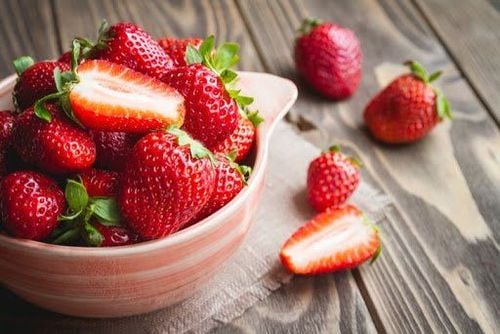This is an automatically translated article.
Succulents include many familiar fruits. These fruits are all healthy foods, have a delicious taste, are rich in nutrients and offer many health benefits.1. What are the characteristics of berries?
Berries are round, small, soft berries that come in a variety of colors but are mostly blue, red, and purple. They have a sour or sweet taste and are often used to make jams or desserts.Berries are rich in fiber, vitamin C and antioxidant polyphenols. Therefore, adding berries to your diet will help you prevent and relieve symptoms of many chronic diseases. The benefits of berries include:
1.1 Provides antioxidants Berries contain antioxidants, which help control free radicals. Free radicals are unstable molecules. If the amount of free radicals in the body is too large, it will damage the cells.
Berries are a rich source of antioxidants, including anthocyanins, ellagic acid and resveratrol. These plant compounds help protect the body's cells and reduce the risk of disease. Several studies have shown that the antioxidants in berries help reduce oxidative stress.
1.2 Improves blood sugar Studies have shown that berries help protect the body's cells from high blood sugar, helping to increase insulin sensitivity. At the same time, it helps lower blood sugar and insulin response to high-carb meals. These effects were seen in both healthy and insulin resistant subjects.
1.3 High in fiber Berries are a very good source of fiber, including soluble fiber. Studies show that consuming a lot of soluble fiber slows down the movement of food through the digestive tract, thereby reducing hunger. Moreover, fiber also helps reduce the number of calories that you absorb from meals. This helps reduce the number of calories that the body consumes, thereby making it easier to control weight.
1.4 Provides many nutrients Berries are low in calories and very nutritious. In addition to being packed with antioxidants, they are also rich in vitamins and minerals. Berries, especially strawberries, contain a lot of vitamin C. In addition, they also contain other substances such as manganese, vitamin K1, copper, folate,...
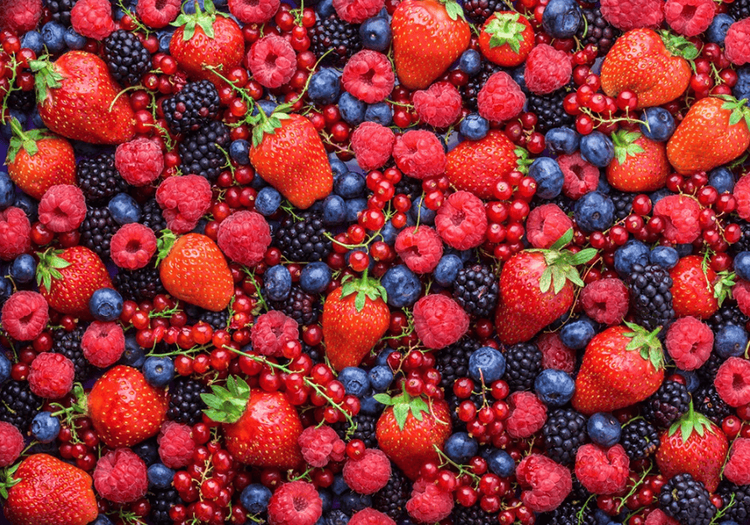
Quả mọng là loại quả giàu chất chống oxy hóa, vitamin và khoáng chất
Some studies show that the antioxidants in berries can help reduce symptoms of inflammation.
1.6 Lowers cholesterol levels Berries are also heart-healthy foods. Blackberries and strawberries have been shown to lower cholesterol in people who are obese or have metabolic syndrome. In addition, berries help prevent oxidized LDL cholesterol - a major risk factor for heart disease.
1.7 Good for skin Berries can help reduce wrinkles on the skin, as the antioxidants in berries help control free radicals that are responsible for skin damage and skin aging. The ellagic acid in berries has many benefits for the skin. Many studies show that ellagic acid can protect the skin by blocking the production of enzymes that break down collagen in the skin.
1.8 Cancer Prevention The antioxidants in berries like ellagic acid, anthocyanins and resveratrol are thought to reduce the risk of cancer. Specifically, animal and human studies suggest that berries may protect against esophageal cancer, oral cancer, breast cancer, and colon cancer.
1.9 Uses for Diets Berries are foods that can be included in diets. Although people following low-carb diets and ketogenic diets often limit their fruit intake, you can still enjoy berries in moderation. People who follow a Mediterranean-style diet, vegetarian, ... can eat berries comfortably. For those looking to lose weight, berries are low in calories making them ideal for main meals, snacks or desserts.
People who need to avoid eating berries are people who are required to eat a low-fiber diet due to digestive disorders and people who are allergic to berries.
1.10 Protects the arteries In addition to lowering cholesterol, berries offer many other benefits for heart health, including improved function of the arteries.
The cells that line blood vessels are called endothelial cells. They control blood pressure, keep blood from clotting, and many other important functions. Inflammation can damage these cells, inhibiting their functions. And it leads to endothelial dysfunction - a risk factor for heart disease.
The results of many studies show that berries can improve endothelial function in healthy adults, people with metabolic syndrome, and even smokers. Fresh berries have the greatest benefit and conversely less benefit than processed berries.
1.11 Delicious Berries are delicious, they make great snacks or desserts whether you use just one or combine several berries together. Besides, berries also have a very natural sweetness, no need to add sweeteners, but you can combine them with whipped cream to create a more delicious dessert.
For breakfast, try mixing berries with Greek yogurt or cottage cheese with nuts. Another option is to add berries to salads.
1.5 Anti-inflammatory Berries have strong anti-inflammatory properties. Inflammation is the body's defense mechanism against infection or injury. However, modern lifestyles often lead to chronic inflammation caused by increased stress, less physical activity, and unhealthy food choices. Chronic pills are a risk factor for diabetes, heart disease, and obesity.
Some studies show that the antioxidants in berries can help reduce symptoms of inflammation.
1.6 Lowers cholesterol levels Berries are also heart-healthy foods. Blackberries and strawberries have been shown to lower cholesterol in people who are obese or have metabolic syndrome. In addition, berries help prevent oxidized LDL cholesterol - a major risk factor for heart disease.
1.7 Good for skin Berries can help reduce wrinkles on the skin, as the antioxidants in berries help control free radicals that are responsible for skin damage and skin aging. The ellagic acid in berries has many benefits for the skin. Many studies show that ellagic acid can protect the skin by blocking the production of enzymes that break down collagen in the skin.
1.8 Cancer Prevention The antioxidants in berries like ellagic acid, anthocyanins and resveratrol are thought to reduce the risk of cancer. Specifically, animal and human studies suggest that berries may protect against esophageal cancer, oral cancer, breast cancer, and colon cancer.
1.9 Uses for Diets Berries are foods that can be included in diets. Although people following low-carb diets and ketogenic diets often limit their fruit intake, you can still enjoy berries in moderation. People who follow a Mediterranean-style diet, vegetarian, ... can eat berries comfortably. For those looking to lose weight, berries are low in calories making them ideal for main meals, snacks or desserts.
People who need to avoid eating berries are people who are required to eat a low-fiber diet due to digestive disorders and people who are allergic to berries.
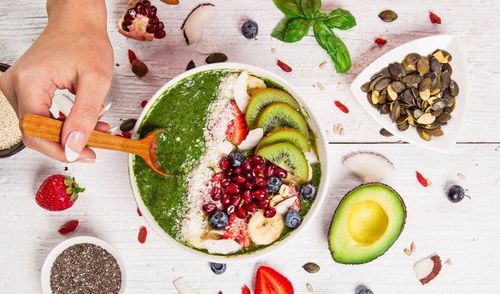
Bạn có thể đưa quả mọng vào thực đơn ăn kiêng của mình
The cells that line blood vessels are called endothelial cells. They control blood pressure, keep blood from clotting, and many other important functions. Inflammation can damage these cells, inhibiting their functions. And it leads to endothelial dysfunction - a risk factor for heart disease.
The results of many studies show that berries can improve endothelial function in healthy adults, people with metabolic syndrome, and even smokers. Fresh berries have the greatest benefit and conversely less benefit than processed berries.
1.11 Delicious Berries are delicious, they make great snacks or desserts whether you use just one or combine several berries together. Besides, berries also have a very natural sweetness, no need to add sweeteners, but you can combine them with whipped cream to create a more delicious dessert.
For breakfast, try mixing berries with Greek yogurt or cottage cheese with nuts. Another option is to add berries to salads.
2. What are berries?
Here are the 8 healthiest berries:2.1 Blueberries Blueberries are a rich source of vitamin K. Blueberries are rich in fiber, vitamin C, vitamin K, manganese and anthocyanins (antioxidants). Anthocyanins from blueberries help reduce oxidative stress, which in turn reduces the risk of cardiovascular disease in healthy people and those at high risk for the disease. In addition, blueberries also lower LDL cholesterol (bad cholesterol) in the blood, reduce the risk of heart attacks and enhance artery function. Besides, blueberries also reduce the risk of type 2 diabetes and improve insulin sensitivity. At the same time, people who ate blueberries also had a slower rate of cognitive decline, meaning their brains remained healthier as they got older.
2.2 Raspberries Raspberries are often eaten in desserts and are a great source of fiber. Raspberries are rich in fiber, vitamin C, vitamin K, manganese and ellagitannins (antioxidants) - which help reduce oxidative stress.
Red raspberries and black raspberries both have many health benefits. Blackberries are especially good for heart health. Studies have shown that blackberries help reduce risk factors for cardiovascular disease. It also reduces inflammation in people with metabolic syndrome.
2.3 Goji berries are native to China and are used in Traditional Medicine. Recently, they have become very popular in Western countries. Goji berries are high in fiber, vitamin C, vitamin A and iron. In particular, the high levels of vitamin A and zeaxanthin in this berry are important for eye health.
One study found that eating goji berries regularly reduced the decline in eye health caused by aging. In addition, goji berries also contain antioxidant polyphenols and help enhance the body's metabolism, reducing waist size in overweight people.
2.4 Strawberries Strawberries are one of the most commonly consumed fruits in the world and also one of the best sources of vitamin C. This berry is rich in fiber, vitamin C and manganese.
Strawberries are good for heart health. In particular, many studies show that strawberries can reduce several risk factors for cardiovascular disease. In addition, this fruit also helps reduce inflammation by reducing inflammatory substances in the blood such as IL-1β, IL-6 and C-reactive protein (CRP). In addition, strawberries also control blood sugar, help prevent diabetes and aid in the prevention of esophageal cancer.
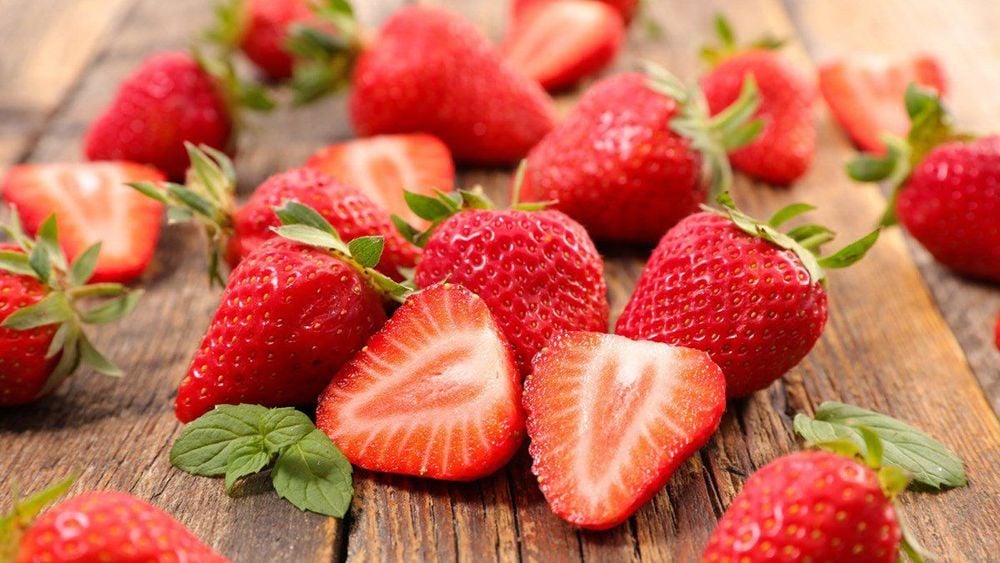
Dâu tây là loại quả mọng có lợi cho sức khỏe tim mạch
Many studies have shown that blackberries have an effective inflammation-reducing effect. Eating blackberries or drinking their juice may reduce inflammation in people at risk for cardiovascular disease or metabolic syndrome. Besides, this fruit also helps in weight control and lowers blood sugar in people with high blood sugar. At the same time, blackberries also increase HDL cholesterol (a type of good cholesterol) and reduce LDL cholesterol (a type of bad cholesterol).
2.6 Acai Fruit The acai fruit is the fruit of the acai palm tree that is native to the Amazon region - Brazil. They are a very good health supplement because of their high antioxidant content. Acai berries are also rich in fiber.
This berry is one of the best sources of antioxidant polyphenols, containing 10 times more antioxidants than blueberries. When used in juice or powder form, acai berries can increase blood antioxidant levels and reduce oxidative stressors. In addition, acai berry powder has also been shown to help reduce blood sugar, insulin and blood cholesterol levels in overweight people. Drinking acai juice can speed up recovery from a muscle strain. Not only that, the antioxidants in acai berries also help reduce the symptoms of osteoarthritis.
2.7 Cranberries Cranberries are a healthy, tart fruit. They are usually used in the form of a juice. This fruit is a good source of fiber, vitamin C and manganese.
Like other berries, cranberries contain polyphenols - antioxidants. The biggest health benefit of this fruit is reducing the risk of urinary tract infections (preventing E.coli bacteria from attaching to the bladder or urinary tract walls). In addition, cranberry juice also reduces the risk of certain other infections (prevents H.pylori bacteria from attaching to the stomach wall, prevents stomach ulcers and cancer). At the same time, this fruit juice has many benefits for heart health such as: Lowers cholesterol, blood pressure, oxidative stress,... However, you need to pay attention not to drink cranberry juice which has more Street.
2.8 Grapes Grapes are fruits that can be eaten raw, pressed into juice, processed into wine or raisins,... Grapes are high in fiber, vitamin C and vitamin K.
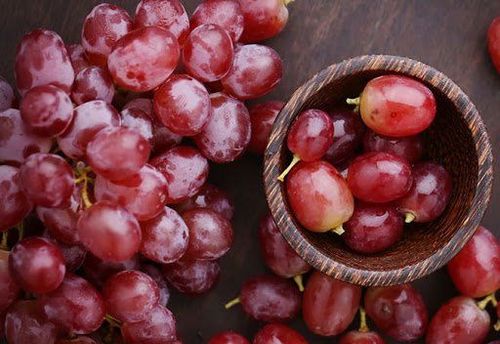
Nho chứa ít calo, giàu chất xơ, vitamin và chất chống oxy hóa
Berries are a healthy food because they are low in calories but rich in fiber, vitamins and antioxidants. These fruits are all beneficial for heart health, reduce the risk of type 2 diabetes, etc. You can include them in your diet to improve your overall health.
Please dial HOTLINE for more information or register for an appointment HERE. Download MyVinmec app to make appointments faster and to manage your bookings easily.
Reference source: healthline.com





